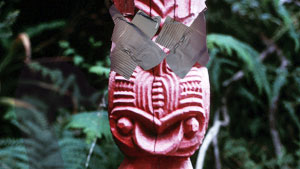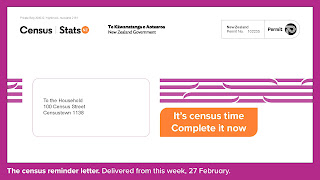13 reasons the Infringing File Sharing Act is bad for you
Many of you have been asking what the big deal is about the new copyright legislation "Copyright (Infringing File Sharing) Amendment Bill 119-2". Is it a good measure for stopping illegal downloads? Not even close. It's bad for everyone, while having questionable impact on the (supposed) problem.
First, in case you missed the news: http://www.3news.co.nz/Govts-Skynet-legislation-becomes-law/tabid/412/articleID/206882/Default.aspx
There are so many problems with this law. I've listed thirteen here. There are others more fundamental especially relating to what the law should be expected to achieve: the debate over the intention of copyrights and what should be protected under them, which is a natural consequence of the birth of the information society. But that's a big subject with a lot of history, that I hope to write about some other time.
Some reasons are legal, some ethical, and some technical but nonetheless crucial:
1. Presumed guilty on accusation
Despite the revision committee trying to fudge the issue, this law does work via the presumption of guilt. If the accused party has had their three warnings and goes to the Copyright Tribunal, they have to give reasons why the warnings were invalid. But if the accused party is innocent, what reasons can they have, apart from "I didn't do it"?
 |
| how to prove you're not in league with scurvy ne'er-do-wells like this? |
Presumption of guilt is rife for abuse, as has happened overseas under similar laws. In the digital realm evidence is often temporary, complex, and easily fabricated, so providing evidence of your innocence could be very difficult, depending on how much is required. Providing evidence of your guilt is almost as difficult, but why should that mean an advantage be given to accusers? New Zealand intellectual property lawyer Rick Shera says the law is grossly unfair, out of place and unnecessary in this analysis:
When a new law contradicts the Bill of Rights it better have an extremely good reason... and protecting the entertainment industry isn't one.
2. Unsupported accusations
New Zealand Judge David Harvey has noted that 30% of copyright litigation fails due to inability to prove ownership of copyright, or due to the copyright in question not being governed by New Zealand law. Yet this law encourages more copyright infringement charges, and puts the onus on the accused to prove themselves. There is no penalty for making spurious allegations.
3. Stifled creativity and innovation
People are often accused unreasonably, for instance for quoting a section of a work to comment on it, for sampling, or for making a parody. This is why US law has the concept of "fair use" - in NZ it is called "fair dealing". The Creative Freedom Foundation, a charity representing thousands of Kiwi artists, has written a short explanation of copyright and how the new law will stifle creativity.
Some copyright owners frequently make claims of infringement even when the use is fair because users are likely to forgo their use of the work rather than spend money defending themselves - in other words, for legal intimidation.
Even without accusations, creativity is stifled by laws like this. YouTube continually removes videos that have no right being removed, simply at the request of a copyright owner.
4. Disproportionate penalties
Firstly, if found guilty you could potentially be fined $15,000 for downloading a single song - there's no clarity in the law about what a appropriate fine would be. The purported cost of copyright infringement is very arbitrary: Overseas, people have been ordered to pay millions of dollars for downloading a small number of songs, for instance this mother of four charged US$1.9m for using file-sharing software to download 24 songs.
5. Token notice challenging
[Sorry for the previous version of this reason re timing, I misread the law]
There is provision for accused to challenge infringement notices but it seems rather unlikely that a challenge would succeed since it's the accuser who accepts or rejects the challenge, and there's no benefit to the accuser in accepting it.
6. The law is ill-defined
I've already mentioned how the law doesn't define the level of proof required to rebut the presumption of guilt, nor how to determine fines.
The technical definitions are particularly useless. For instance, it defines file-sharing as where:
“(a) material is uploaded via, or downloaded from, the Internet using an application or network that enables the simultaneous sharing of material between multiple users; and
(b) uploading and downloading may, but need not, occur at the same time”
Downloading from a network using a network? That's meaningless. Besides that, it is very loose, any internet activity could conceivably be covered by this. That's clearly not the intent. This kind of thing is very difficult to define - still, it needs to be better than this. There are other things such as the change from using the term ISP (Internet Service Provider) to IPAP (Internet Protocol Address Provider), a change which will become meaningless in the next few years as IPv6 makes everyone potentially an IPAP. So not only is it loosely defined, it's already outdated (this last would most likely would have been fixed if the law had gone through the proper process).
7. ISP costs
Compliance with this law is going to cost ISPs. Although accusers are required to pay ISPs a fee, there is no consideration for the capital expenditure required to setup the system. And they only have four months to get it up and running. This could be very significant for smaller ISPs.
UPDATE 1 June: Lawyer Rick Shera has posted about this, including the Telecommunications Carriers' Forum submission to MED on the law which includes 19 steps ISPs will have to take to comply with the new law (that MED somehow thinks could be doable for $2).
So you can expect your internet connection to be more expensive than it would otherwise be.
8. Violated human rights
More importantly, your internet access could be terminated. This law was passed just two days after Tim Berners-Lee (credited with the invention of the World Wide Web) declared "access to the web is now a human right". The UN has proposed that internet access should be a human right, and it already is in France, Finland, Estonia and Greece.
Terminating internet in response to infringing copyright is worse than the post office stopping deliveries to your house because you sent photocopies to someone. The earlier law was revised due to protests over internet termination. The new bill disables that penalty for the moment, however it can be re-enabled with an order-in-council, not needing any public consultation or parliamentary vote.
Which leads on to the problems relating to how this law came to be:
9. Political precedence of law ambush
Urgency is supposed to be for urgent issues. National has passed 17 laws under urgency in the last two years, most of them completely unjustified. The passing of this law without proper process sets a particularly bad precedent.
This law has made headlines throughout the tech world, along with comments on the sucker-punch nature of its passing, and how equivalent laws overseas have been pushing through in a similar way (eg. UK's Digital Economy Act 2010):
“Groups like Creative Freedom NZ, which helped lead protests against the initial bill, were taken by surprise. "The item has been due to go through the house for a while now, but has been fairly low on the list," said the group. "We are surprised to find out that it is being rushed through under urgency, and we’re not alone; MPs who have been involved in the process are surprised as well."”
Using the Canterbury earthquake as an excuse to push through a law in response to the entertainment oligopoly complaining about supposed lost profits, is shameful.
10. Lawmakers who don't understand the law, let alone basic technical facts
Next, it was blatantly obvious that most of the voting MPs didn't understand what they were talking about. In what the National Business Review called "a debate that often sunk to almost surreal levels of technical ignorance", MPs made fools of themselves saying things like:
"Do you remember the movie "The Terminator"? I'm sure that you do. And the computer system... yes... the computer system called Skynet that ruled the world. It's like the Internet today."
Oh the perfect irony of analogizing the internet-enabled masses as evil robot overlords, and the government and corporates trying to control the internet as underdog freedom-fighters...
Topping the irony charts was Melissa Lee.
Her speech actually had an interesting point about how the multi-billion dollar Korean movie industry was made possible through blatant copyright infringement by the Chinese. But she then went on to talk about the damage done by lesser forms of piracy like file-sharing, and how infringing copyrights is always an intentional illegal act. The kicker is, just hours before making her speech, she tweeted about a music compilation a friend copied for her! When confronted about it, she replied that the songs were legally downloaded and paid for - proving she doesn't know what the current copyright law is, despite voting on the law, and holding herself up as an example of an unintentional pirate.
Then there are the technical issues with copyright enforcement:
11. Trojaned machines
There are millions of computers infected with viruses which hackers use to do whatever they want - for instance, sending spam, hacking more computers, or sharing copyrighted files via file-sharing networks. (Yet another reason to make sure you install your updates and don't visit dodgy websites or install untrusted applications - not that this is proof against hackers, it just makes exploits less likely.) You should not be held liable for what a hacker does with your computer without your permission. But how can you prove you were hacked? Viruses can remove themselves after acting. And if being hacked is a reasonable defence, pirates can use it as a defence too, just by claiming it or perhaps purposefully allowing themselves to be hacked. (Now there's an interesting new reason for hackers to make viruses: a viral file-sharing network, where some people would be users without their permission - thus giving plausible deniability to all users.)
12. Shared connections
How can copyright holders identify people who infringe? One way is through file-sharing programs where users have accounts. It may be possible to track these to a person in New Zealand. But most piracy isn't done through any account except an internet account. Most internet connections are shared between many people. So how would copyright holders know which person to accuse? They can't. Your ISP can only trace web traffic to your router (often only with a lot of work) - they can't see where traffic goes after that. So the copyright holder can only accuse the account holder. So if your flatmate infringes, you will be the one having to prove your innocence. Or if someone hacks into your wireless connection and uses it to infringe copyright, you will pay the penalty.
Likewise companies have to take responsibility for all their employees - an excellent encouragement for companies to enact draconian firewalls against their employees. When an employee is accused, it may take a great deal of effort to track down which employee it was - if it is even possible. Similarly with any company providing a connection, like hotels, cafés and airlines.
Expect company-provided internet access to be more restrictive and better monitored.
13. Real pirates don't get caught
The most problematic pirates - the ones who upload unreleased movies or sell pirated copies - are very unlikely to be caught. They use anonymizing techniques and encryption to make their downloading untraceable. The same goes for hackers or anyone with the technical know-how. Or anyone connecting via an internet hotspot or public wi-fi. Or those who just download without using peer-to-peer software. So those caught are much more likely to be accidental and small-scale infringers, not those the law is primarily intended to stop.
The Copyright Tribunal will have only 5 people, so it can hardly handle a large number of cases. A small number of unlucky people will be made an example of, which will dissuade the most casual pirates - i.e. the kind of people whose piracy probably earns creative industries more in advertising than they lose in profits (but that last part is an argument I don't have space to explain here).
That's 13 reasons why this new law is bad and why law-abiding citizens will be worse off under it.
 |
| you, accused of infringing copyrights under the new law |
What you can do
There's a list of ways you can protest the law at: https://www.facebook.com/notes/opposing-the-copyright-infringing-file-sharing-amendment-bill/information-on-what-you-can-do-to-help/141454075923884
 from Marko Simich, used without permission. I'm tempted to change my name on Facebook to "John Connor"... but I've settled for merely changing my profile pics.
from Marko Simich, used without permission. I'm tempted to change my name on Facebook to "John Connor"... but I've settled for merely changing my profile pics.Other sources
- The full text of the law
- Internet file sharing law passes after loopy debate, National Business Review
- Copyright Bill has Second Reading in Parliament, Creative Freedom Foundation
- An own goal, Kiwiblog
- The file-sharing bill, Russel Brown
- The right to Internet access, Wikipedia
- Telecommunications data retention, Wikipedia
- IPv6, Wikipedia
- ISP says new copyright law effectively useless, National Business Review
- Kiwi MP Called Out As Pirate After Passing Anti-Piracy Law, TorrentFreak
- YouTube Copyright School (Happy Tree Friends, yay!)
P.S.
OK that's ridiculous, I really need to setup a blog... Facebook notes are painful...
P.P.S.
I couldn't resist using the word "sucker-punch" :P
Originally published to Facebook on 21 April 2011 - see further updates and comments there.
EDIT 25 April: Added several sentences to #6, including note about ISP vs. IPAP.
EDIT 4 May: Minor improvements (first paragraph, #12 you could be penalized for having your wireless connection hacked, minor fixes thanks to Boing Boing comments)
EDIT 5 May: Fixed #5, I misread the law - there is enough time for the warnings, so instead I've pointed out that the provision for challenging them is a token gesture










Comments
Post a Comment